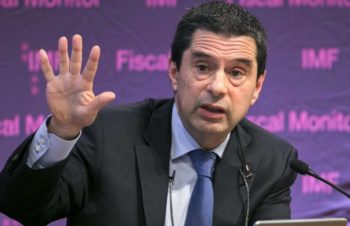
The International Monetary Fund (IMF) says 66 percent of Nigeria’s tax revenues is spent on servicing debts, calling on the country to raise taxes.
Speaking at the IMF Fiscal Monitor briefing in Washington on Wednesday, Vitor Gaspar, director of the fund’s Fiscal Affairs department, said he is happy the Nigerian government now sees taxation as a path to development.
“I had the privilege of visiting Nigeria some months ago and I was very happy to understand that for the authorities in Nigeria, fiscal policies in general and tax policy in particular are part of the strategy for development,” he said.
“That is precisely how I believe fiscal policy should be thought in developing countries as part of the development strategy.”
Catherine Patillo, assistant director and chief of Fiscal Policy and Surveillance Division of the IMF, said Nigeria has needs strong fiscal consolidation and improved taxation, stating that revenue-to-interest ratio is on the increase.
“The Economic recovery and growth programme (ERGP) is very welcomed,” Patillo said.
“It focuses on diversification, private sector-led diversification and in addressing some of the deep-seated problems related to strengthening infrastructure, which is necessary for diversification, as well as building revenues, particularly non-oil revenues.
“So, we very much welcome the ERGP. It is an opportuned time, as you are aware Nigeria went into recession last year, we’ve forecasted recovery, but still very fragile this year and the need to address the fiscal situation is quite urgent.
“Our recommendation is for the continued strong fiscal consolidation, debt has risen, the profile has weakened; one striking statistics I think is the fact that over the past year, the ratio of interest payment to tax revenue has doubled to 66 percent in Nigeria.
“So, two-thirds of all tax revenue is going into interest payment, illustrating the need to raise tax revenue. That would allow the government to implement the social and growth-friendly policies that are part of the objectives of the ERGP.”
Copyright Ships & Ports Ltd. Permission to use quotations from this article is granted subject to appropriate credit given to www.shipsandports.com.ng as the source.
